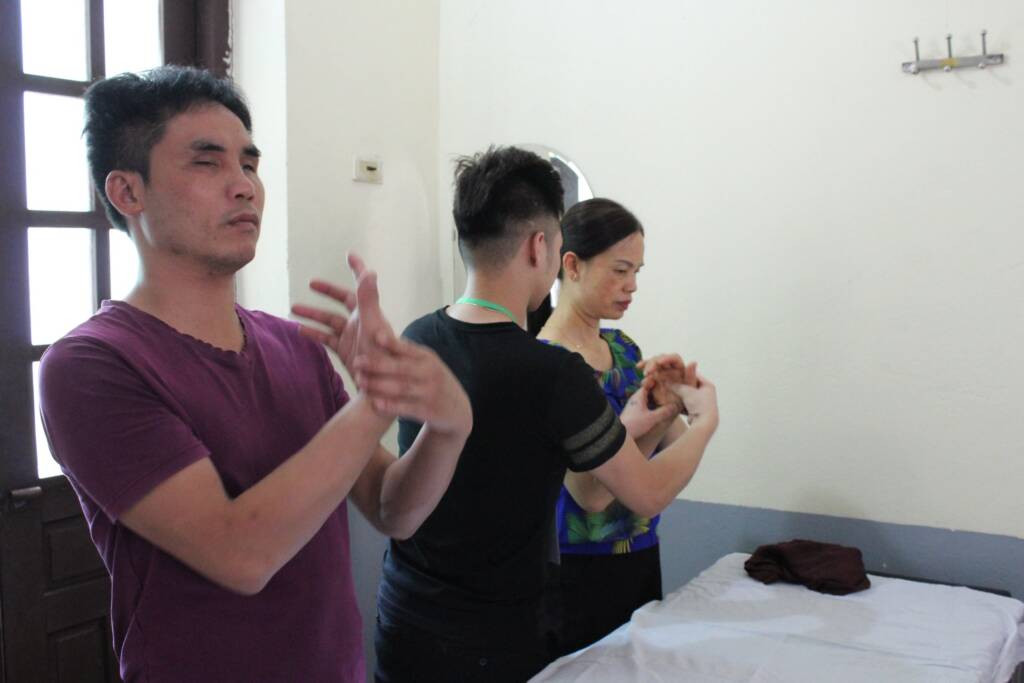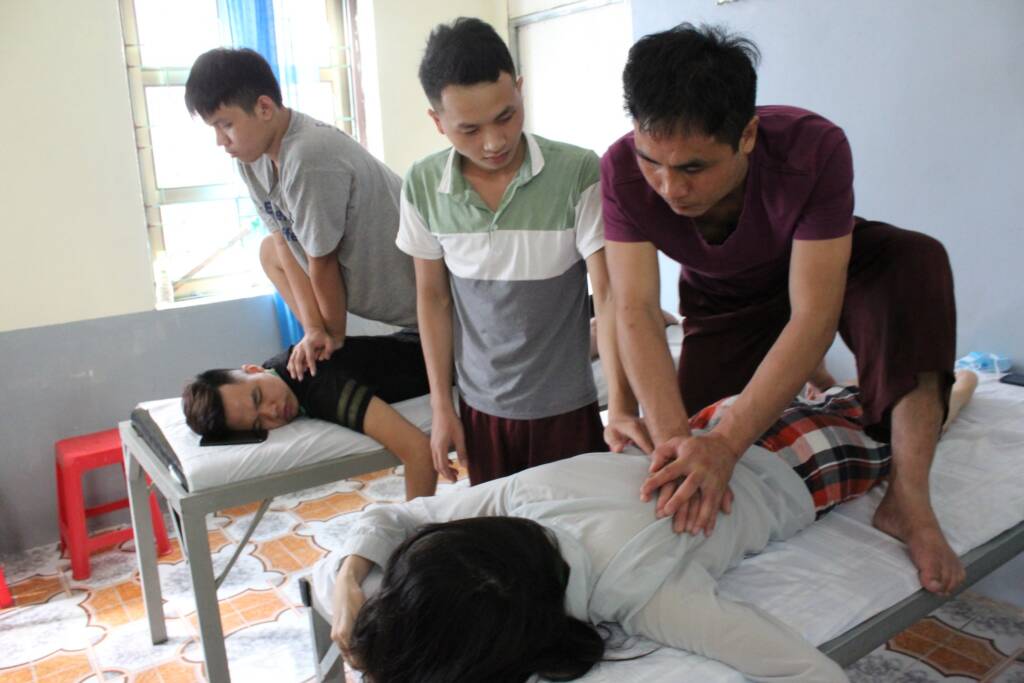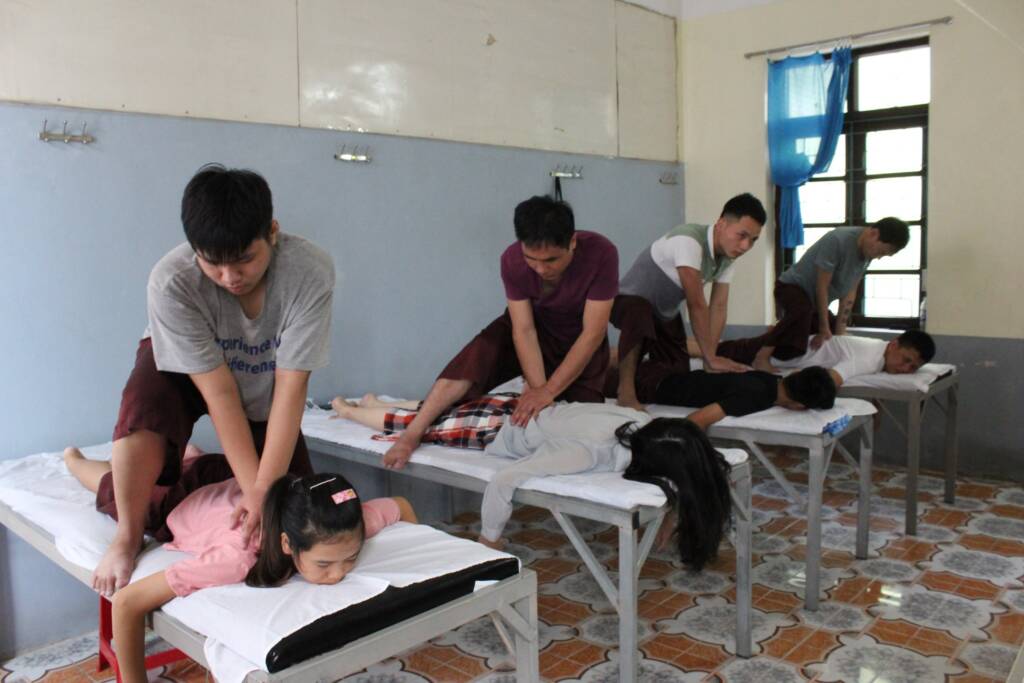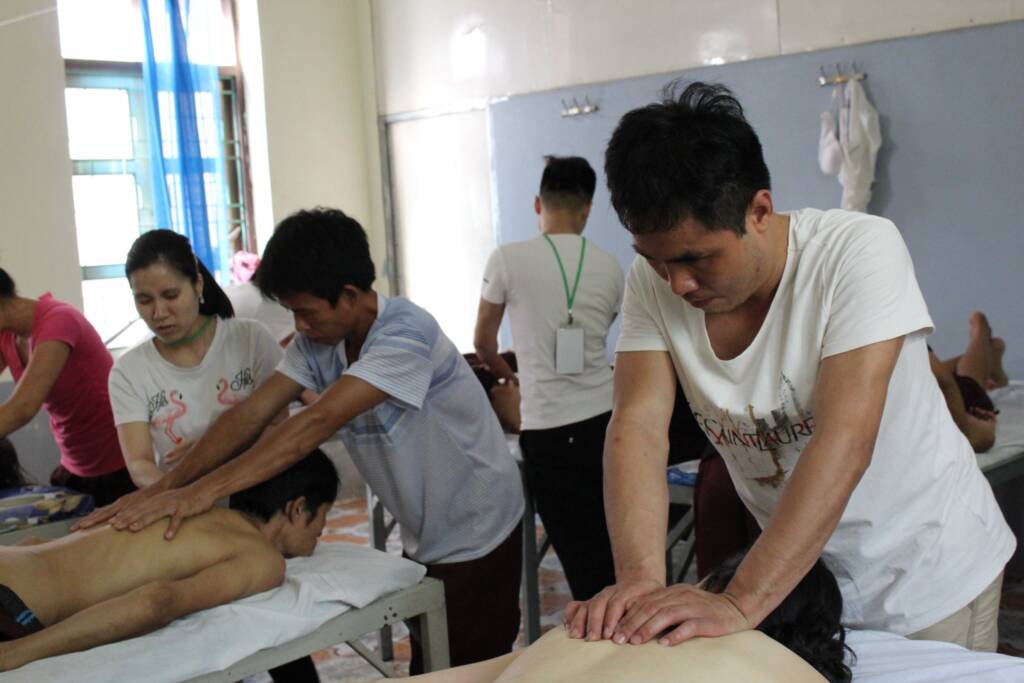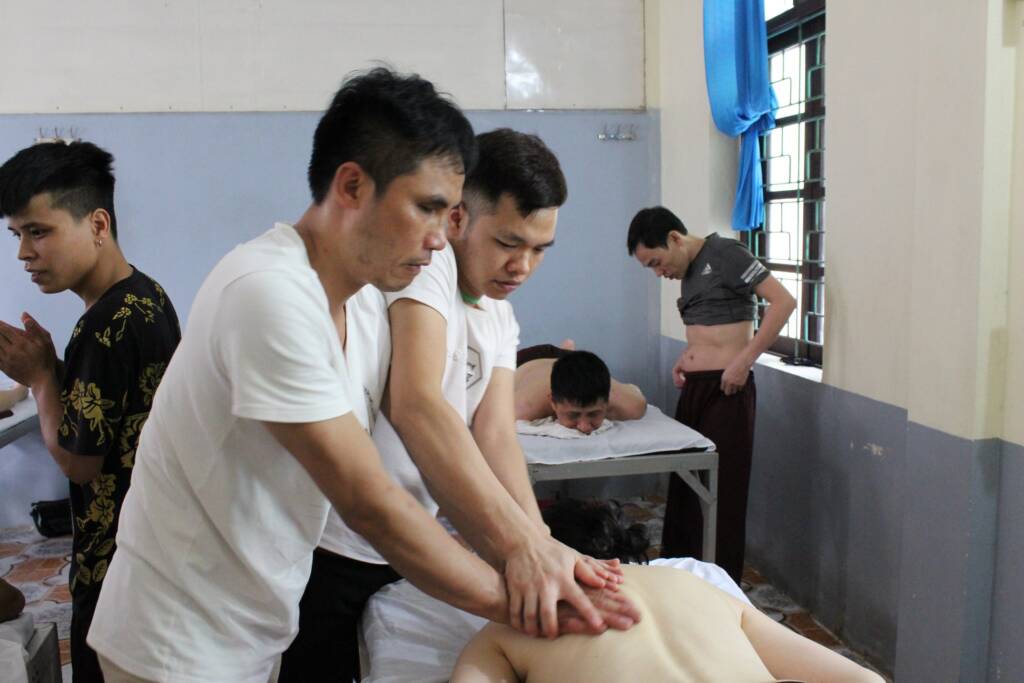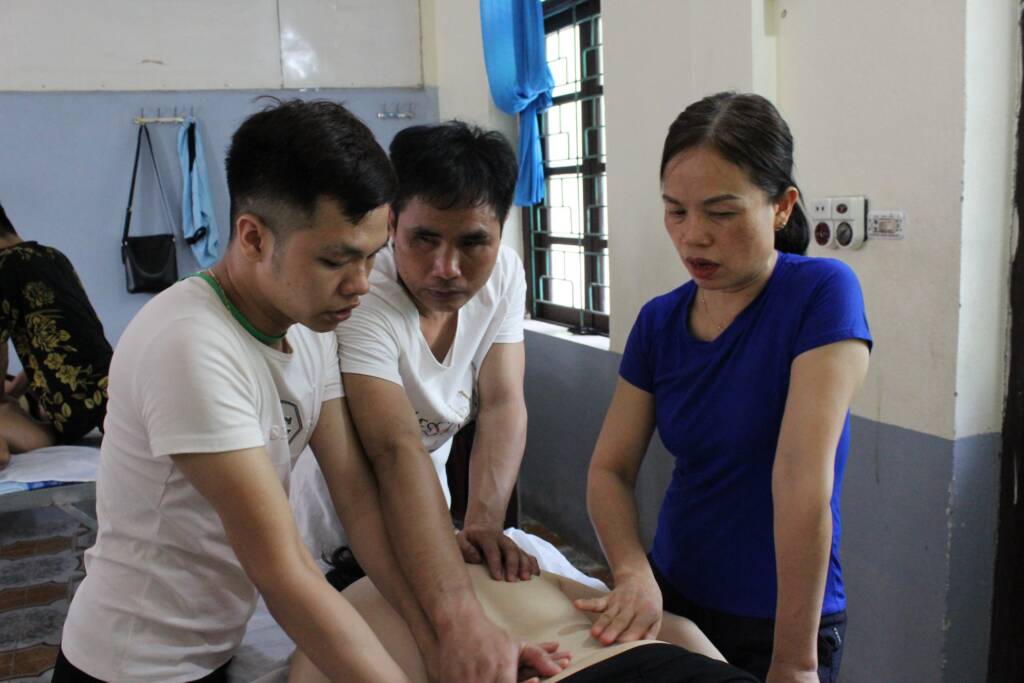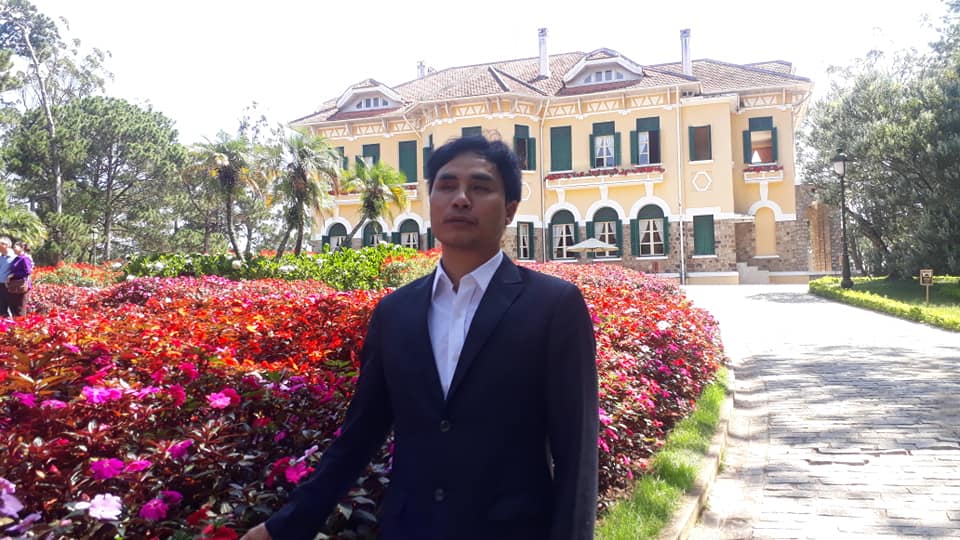Giang, vice chairman of Ninh Binh province’s Blind Association is one of excellent graduates from our Swedish Massage Training course in 2020. Giang’s life began within the embrace of a family where all four siblings—two brothers and two sisters—shared a common challenge: congenital blindness due to an undiagnosed condition. Growing up in a financially struggling household, hospital visits were not only emotionally draining but also economically taxing, often leading to tense arguments between his parents over mounting medical expenses. Despite these formidable challenges, each sibling carved their own path: his brother manages a small livestock farm, his sister works with the Provincial Blind Association, and his youngest sister has built a family in Ba Vì while practicing massage therapy.
Giang’s own blindness developed gradually, beginning in March 1996 and culminating in complete vision loss by June of that same year, just before he could finish 5th grade. He spent three isolated years confined to his home, a period of profound solitude, before finding a new direction in 1999 when he joined the local blind association. This pivotal connection helped redirect his life. In 2001, he was admitted to Nguyễn Đình Chiểu School for the Blind located in Hanoi, where he restarted his education and eventually completed his lower secondary schooling.
It was during his time at Nguyễn Đình Chiểu School that Giang discovered massage therapy as a meaningful career path. He diligently worked part-time at a nearby massage center in the evenings, recognizing how perfectly suited this profession was for the blind. This experience planted the seed for a much larger vision: to bring professional massage training and sustainable job opportunities to the blind community in his rural hometown of Yên Khánh, Ninh Binh province.
In 2006, shortly after graduating, Giang made a courageous decision. He turned down a rare and well-paying offer to stay and work at the massage center of Nguyễn Đình Chiểu School, choosing instead to return home and establish the very first blind massage clinic in his district. This pioneering journey was anything but easy.
The Yen Khanh district’s Blind Association managed to rent a small space and secured 7 million VND from the local Department of Labor, War Invalids, and Social Affairs to purchase essential massage beds. However, the clinic lacked basic amenities like fans or heating, making winters particularly challenging. At that time, massage therapy was still viewed with suspicion in rural areas, leading to neighbors gathering across the street, scrutinizing the facility to ensure its “legitimacy.” Several trainees, daunted by the early difficulties, left before mastering the craft, and crucial equipment had to be purchased through loans from generous friends and family.
The initial three months were a struggle, barely enough to cover food expenses – mercifully, no rice from home was needed. But after that lean period, business slowly, steadily improved. Six months in, the clinic was bustling with clients, a testament to their perseverance. Just as momentum picked up, another setback struck: the landlord reclaimed the property, forcing them to suspend operations for three months and losing some of their most dedicated staff.
Between 2006 and 2017, the clinic endured six forced relocations, each move demanding fresh investment and renewed effort. A major turning point arrived in 2017. The district government announced plans to renovate the local market, where Giang’s clinic was then located. Paying a mere 800,000 VND in rent, they were suddenly faced with vacating the premises. The only viable option for long-term stability was to purchase their own property.
The asking price was a daunting 700 million VND. To make this monumental purchase, Giang and his family collectively mortgaged three land use rights certificates (sổ đỏ), secured a 350 million VND loan from the bank, an additional 100 million using his wife’s certificate, and a 200 million VND preferential loan through the Ninh Binh Province’s Blind Association. Every month since, they have meticulously dedicated all surplus income to repaying these loans. Today, more than two-thirds of this significant debt has been successfully repaid.
Giang’s personal life is a source of immense pride. His wife is a dedicated kindergarten teacher, and together they are raising three wonderful daughters, aged 4 to 13. Before he lost his sight, Giang harbored a dream of becoming a literature teacher. However, after going blind and encountering others facing even greater challenges, his life’s mission deepened: to uplift and empower the blind community in all aspects of life.
One of the biggest systemic barriers he tirelessly advocates against is the convoluted process of aid distribution. “Helping the blind should be hands-on,” he asserts. Yet, most aid programs are structured through formal organizations, with funds and resources often passing through several administrative levels before reaching the people who need them most—if they reach them at all. “Many blind individuals never receive the support meant for them. I believe in delivering assistance directly.”
Giang also passionately advocates for better education and life skills training for families raising blind children. “Right now, there’s no program to teach parents how to raise visually impaired kids. Many are ashamed and keep their children at home, hidden from society.” He tragically notes that of the 11 blind children he knows in his immediate area, only two have been sent to specialized schools. Though he attended two valuable parenting workshops in Hải Dương, organized by Vietnam’s Central Eye Hospital and CBM (Christoffel-Blindenmission), no domestic organization has yet taken the lead on offering these crucial courses widely. A major reason? The significant economic sacrifice involved. “Parents are hesitant to attend 10-day courses because they’d lose income for the month,” he explains, highlighting the difficult choices families face.
Beyond his tireless work in massage therapy and community leadership, Giang nurtures a personal passion for music. He studied guitar and traditional Vietnamese instruments at the National Rehabilitation Center for the Blind and still finds joy in singing at community events. He dedicates his free time to reading news articles and is keen on learning advanced computer skills, which he believes will further enhance his effectiveness as a local leader.
As a white cane user, Giang is pragmatic, employing it primarily when navigating unfamiliar places. In familiar areas, he relies on muscle memory and touch, a trust that once led to a serious accident: thinking he was on a safe, grass-lined path, he accidentally stepped into an unmarked canal. Fortunately, his ability to swim saved him. When asked how to encourage more blind people to use white canes, he answers without hesitation: “We need ongoing advocacy and training. Many young blind people are now working and don’t attend community meetings where cane usage is discussed. But if our organizations made it a requirement and followed up with education, people would adopt it.”
Looking ahead, Giang has a bold and inspiring vision. Within the next three years, he hopes to open a comprehensive professional massage training and employment center at the Ninh Binh Province’s Blind Association, and to launch a vital computer training class specifically for blind staff across different levels of the organization.
As for his personal goals? “Nothing big,” he says with characteristic modesty. “Just to keep working, raising my three little princesses, and hopefully learning more about technology to better serve others.” Giang’s life is a testament to extraordinary resilience, unwavering dedication, and a profound commitment to illuminating the path for others within his community.
Since 2024, Giang has received a well-deserved promotion, becoming the Chairman of Ninh Binh Province’s Blind Association. We wholeheartedly believe that his compassionate leadership, combined with his unparalleled foresight and tireless advocacy, will undoubtedly help bring about significant, positive changes in the lives of blind members and their families in Ninh Binh.
